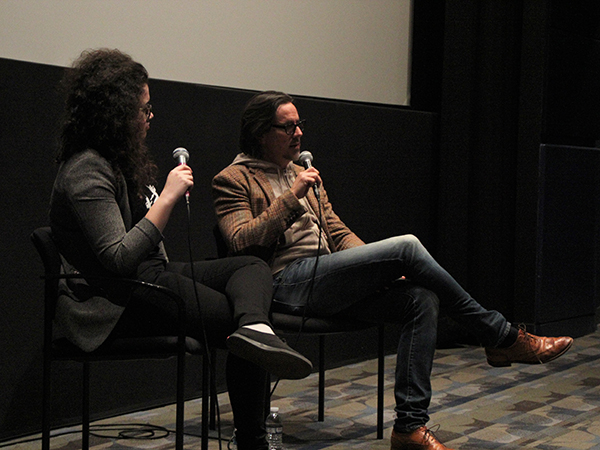‘Big Short’ Writer Draws Big Crowds for Screening, Q&A

About 200 Emerson students and faculty members filled the Bright Family Screening Room on March 16 for a conversation with Oscar-winning screenwriter Charles Randolph, co-writer of The Big Short, following a screening of the film.
He answered questions about his creative process, character development, and his collaboration with crew members and actors. The discussion was moderated by spec president Gabrielle Ruiz ’17. The screening and Q&A concluded Randolph’s day at Emerson, which also included a guest lecture in a Writing for Television class earlier in the day.
This year, Randolph took home an Oscar, BAFTA award, and a Critics’ Choice Award—to name a few of his many achievements—for Best Adapted Screenplay for his work on The Big Short.
The film is an adaptation of Michael Lewis’s book, The Big Short: Inside the Doomsday Machine, which documents the companies and individuals that bet against the U.S. housing market and profited from the 2007–2008 financial crisis. The film used cameos by celebrities like Selena Gomez and Margot Robbie to explain complex economic terms to viewers.
The Big Short—starring Christian Bale, Steve Carell, and Ryan Gosling—follows the stories of young investors looking for a big break, seasoned Wall Street veterans manipulating the system, and middle-aged traders looking to turn a profit amid the mid-2000s economic breakdown. As the protagonists of the film expose viewers to sketchy mortgage brokers who approve loans for vulnerable borrowers, the story sheds light on the people who lost their jobs, homes, and life savings as a result of the economic crash and the ensuing Great Recession.
After the screening, Gabriella Mumma ’18 said that she felt this was an important film for Emerson students to see because almost all students at the College are pursuing some form of storytelling.
“This story is an important one,” she said. It explains “a very real problem that our society faces, and it’s very relevant, and it’s told in a wonderful way that makes it interesting. So as people who want to go on to tell stories, it’s important that we listen to every story being told, even if it’s not a big action movie.”
During the question-and-answer session after the film, Randolph was asked about the improvised lines in the film and how that impacts his writing process. He joked that if someone wants to do his job as a writer, “I don’t care—I still get the credit.” He added it is not common for improvised lines to integrate so smoothly into the rest of the script.
“It is rare, though, that it works as well as it does here,” he noted. “So much of what’s delicious about this movie is not in the script.”
Before his career as a screenwriter, Randolph was a professor of philosophy. When an audience member asked how his philosophical background influenced his writing, he joked, “I got really good at bull—.
“I got really good at slinging that stuff,” he continued. “I feel like I’m pretty good at going into worlds with strong ideological constructs and parsing those ideological constructs.”
After the 45-minute Q&A, Mumma said Randolph’s candid honesty helped humanize him and make him relatable, despite his fame and numerous accomplishments.
“I think it was really cool to hear his perspective,” she said. “It was interesting to hear his creative process, and it brings him back down to Earth off an Oscar-winning pedestal.”
Erin Cook ’18, another audience member at the event, shared similar sentiments.
“I love listening to writers talk. It gives me hope while at the same time beating me down,” she said. “Obviously, we hear from writers who are success stories, which is inspiring, but at the same time I remember how much work goes into it. So it’s incredibly difficult but it’s rewarding when you put the time in.”
Categories